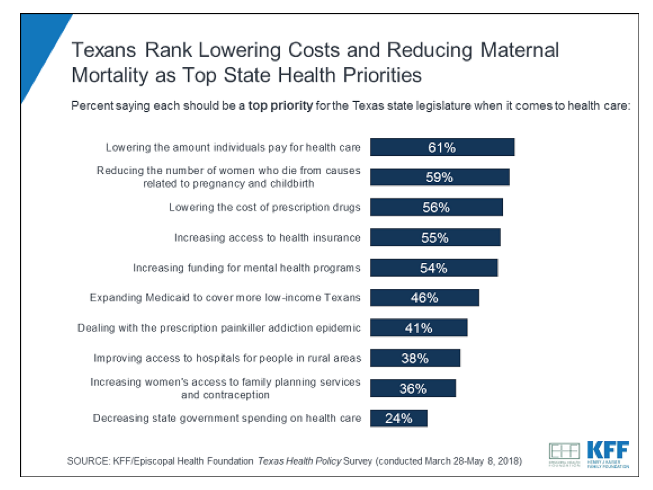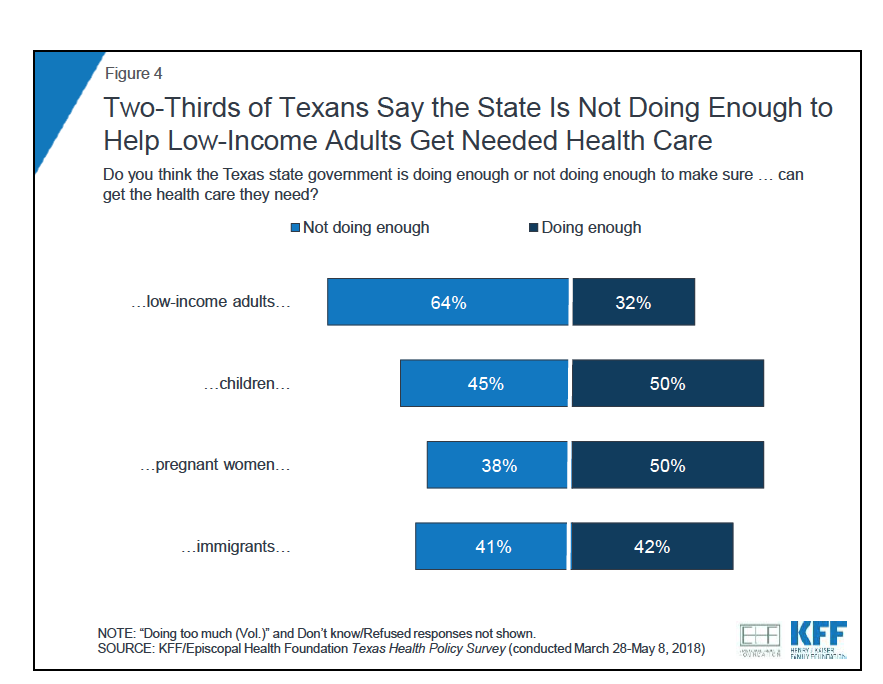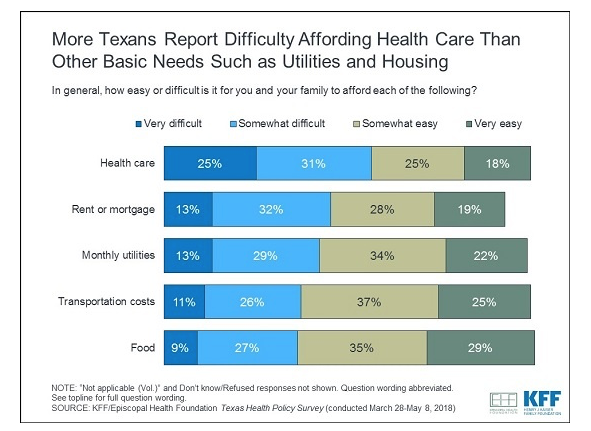Two recent EHF/Kaiser Family Foundation surveys released this summer show that Texans say they’re struggling to access and afford healthcare — and many say the state should be doing more about it.

The first poll report released in June shows that Texans’ top health priorities for the state revolve around making healthcare and prescription drugs more affordable, reducing maternal mortality, and increasing access to health insurance coverage.
Majorities of Texans say “top priority” should be given to lowering what people pay for health care (61%), reducing maternal mortality (59%), lowering prescription drug costs (56%), increasing access to health insurance (55%) and boosting funding for mental health programs (54%).
Two thirds say that the state is not doing enough to help low-income adult residents get needed healthcare
Two thirds (64%) also also favor expanding the state’s Medicaid program to cover more low-income adults and nearly half (46%) of Texans say expanding Medicaid to cover more low-income Texans should be a top priority. 
Texas is one of 17 states that has not expanded its Medicaid program under the Affordable Care Act, which requires the federal government to pay the vast majority of the cost of expanded coverage.
Texas has the highest uninsured rate in the U.S., but most Texans don’t know it
Texas currently has more residents without health insurance than any other state and has the highest uninsured rate in the country (21% among adults ages 19-64, compared to 12% nationally). However, most Texans don’t realize it.
The poll finds that three in 10 (31%) knew that Texas has an above-average uninsured rate, while about one in five (19%) didn’t know it had a above-average uninsured rate. The rest thought it was about the same (34%) or responded that they don’t know (16%).
A second EHF/KFF report shows that being able to afford healthcare is Texans’ top financial concern
In a second report released in July, more than half of Texans said say it’s difficult for them and their families to afford healthcare, including 25% who say it’s “very difficult.”

Fewer report difficulties affording other basic necessities, including rent or mortgage, monthly utilities, transportation costs, or food.
In addition, nearly four in 10 (38%) Texans say they or someone in their household had problems paying medical bills in the past year. Most of this group and 23% of all Texans say medical bills had a major impact on their family.
“Texans said that their state government should be doing more to help many people get access to healthcare and these numbers show why they feel that way.”
Elena Marks, EHF’s president and CEO
Many Texans are also skipping or postponing care due to its costs. Six in 10 (61%) say they or another family member has done at least one of the following due to costs:
44% skipped dental care
42% postponed needed medical care
36% skipped a recommended test or treatment
31% not filled a prescription
21% cut pills in half or skipped doses
14% had problems getting mental health care
Texans report many problems affording health care at a significantly higher rate than adults nationwide
A recent national KFF survey found a quarter (27%) of adults report problems paying medical bills in the past year, significantly fewer than the share among Texans (38%). Texas’ higher rates likely reflect lower average incomes and higher uninsured rates than the nation as a whole.
“Texans are even more likely than Americans overall to face real challenges affording healthcare,” said Drew Altman, KFF’s president and CEO. “This likely reflects Texas’ uninsured rate, though the survey shows that even many residents with insurance are struggling to pay for needed care.”
Among Texans, certain groups are more likely than others to report difficulty in all of these areas. Those with lower incomes, Hispanic residents, and those in poorer health are more likely to report experiencing these types of problems compared to their higher-income, white, and healthier counterparts.
Not surprisingly, uninsured Texans report much higher rates of difficulties affording healthcare, paying medical bills, and postponing or skipping needed care than Texans with insurance.
Cost is the main obstacle to getting more Texans insured. Half (50%) of uninsured Texans say that they main reason they don’t have coverage is because it is too expensive and unaffordable. Far fewer cite other main reasons such as employment issues (15%), not wanting or needing it (7%) or citizenship/residency issues (7%).
1 in 5 Texans don’t have a place where they usually go for medical care
Twenty-one percent say they don’t have a place where they usually go for care when they are sick or need health advice. Others usually visit a doctor’s office (44%), a clinic or health center (20%) or another location such an urgent care or hospital outpatient center (9%).
Click here to see the EHF/KFF surveys and all of EHF’s health policy research reports